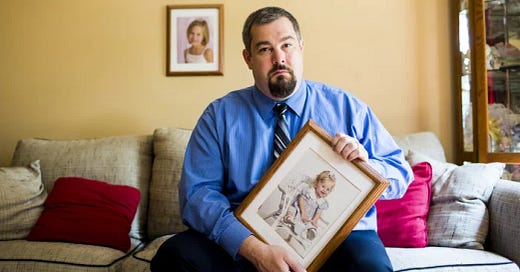Human Tissues are a 1 billion dollar industry, Birth-tissue is an additional 2 billion dollar, unregulated industry and global Organ Transplantation Market size & share was valued at an additioinal USD 7.1 Billion in 2023 and is expected to triple by 2032.
Human tissues for research are said to be worth more than diamonds, being valued at US$500/g.
It's estimated that the “tissue” alone off of a single body can generate revenues of $80,000 or more.
Industry Insider Chris Truitt went from being a tissue industry insider to an industry skeptic.
In 1999, his 2-year-old daughter, Alyssa, died of a sudden health complication. Truitt and his wife, Holly, donated their daughter's organs and tissue, which saved the life of another young girl, Kaylin Arrowood.
Truitt was inspired to take a job on the tissue side of the business for the organ bank in Madison, Wis., where he lived.
Tissue is anything that's not a live organ and can be recovered from a dead body. It can then be turned into scores of medical products.
Every year, 1.5 million of these products are given to American patients.
A tendon from a cadaver can be used to repair a torn ACL; veins are used in heart bypass operations. Dental implants can be made from ground-up human bone, turned into a paste. Bone also gets turned into screws and plates that look like something found in hardware stores. Surgeons can use them to repair a broken leg.
This one-time industry insider no longer endorses tissue donation.
"I will not donate my tissues," he says. "Tissue donation, at the base level, at what I described of helping somebody else live a better life is a phenomenal thing. But unfortunately, just as easy as your tissues can go to something like that, they can also go to penile implants, for example."
The human tissue industry is full of contradictions like that.
Tissue can save or better someone's life, but sometimes it will go to plump up lips and smooth wrinkles.
In the U.S., about 30,000 bodies are donated every year.
"When things first started out, Allograft was a not-for-profit. It was very altruistic. It was a very, very noble thing to do."
Then, one of the tissue bank's biggest customers — RTI Biologics — bought it. The for-profit tissue company placed a bigger emphasis on profit-making, which led to the start of a bizarre competition.
"It was called the Golden Dermatone Award for getting as much skin as you could off a donor," Truitt says.
He explains that a representative of LifeCell, a company that bought skin, would show up at staff meetings and hand out certificates for the technician who got the most square feet of skin off one donor.
"Instead of being stewards of the gift, instead of recovering what the family wanted and treating each donor with the ultimate in respect, the company was actually looking at each donor as a profit machine, as nothing more than raw resources, and it was our job to take as much of those resources as we possibly could," he says.
Truitt says he has struggled financially since leaving his old job, where he made close to six figures. Today, he manages a bank branch. He has also self-published a book called The Dark Side of Tissue Donation.
November 2000: According to the American Association of Tissue Banks, tissue donation has increased by 172% in the past 5 years.
Several academic hospitals in the United States are forming partnerships with biotechnology companies to provide human tissue for use in research, treatment, or drug development.
Harvard University's in Boston and Duke University are among the latest academic hospitals to form partnerships with biotechnology companies for the purpose of providing human tissue for use in research, treatment, and drug development. Both of these institutions have entered into agreements with
Ardais, a “genomics startup company,” which will bank the tissue, collect data, and sell both the data and the tissue to interested parties.
Patients undergoing surgery at these medical centers will be asked to sign permission forms that enable the medical center to send left-over pathology specimens to biotechnology companies.
The biomedical community also has a legacy, however, of using such tissues without the patient's the knowledge.
In the United States, when a patient dies in a hospital or nursing home, doctors must ask if the family consents to organ and tissue donation. A good proportion of these body parts are processed and sold for profit.




Just added this:
"Human tissues for research are said to be worth more than diamonds, being valued at US$500/g."
https://www.ncbi.nlm.nih.gov/pmc/articles/PMC4428037/
This is so evil, every part of us is for sale.